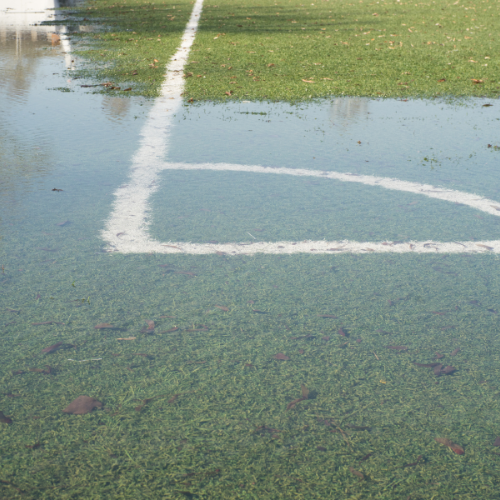After a flood-affected fixture list, grassroots football clubs encouraged to take action now ahead of next season

The Grounds Management Association (GMA), an organisation that helps improve the quality of sports pitches across the country, is urging clubs to take action now to be proactive with their pitch maintenance ahead of next season.
Last year, rainfall in the North East was up 147% on the long-term average. The GMA saw a 244% increase in clubs needing help because of water-logged pitches – the majority came from grassroots sides, including one team that was unable to play for well over half the season.
Chris Hunter, Regional Pitch Advisor at the GMA, is an expert on football pitches. He says: “Now is the time to take action. What clubs do from July through to October is critical for next season.”
Chris adds that cancelled matches can be disappointing for players and costly for clubs: “Football is really important for both physical and mental health. Last season, thousands of children and adults missed out because of waterlogged pitches. It can be really expensive for clubs too. Finding alternative grounds to play at isn’t cheap and if games are cancelled, clubs aren’t getting money from subs. It’s not sustainable.”
Chris says the solution is to support the people who look after the pitches, many of whom are volunteers.
“Groundspeople do amazing work, making football possible across the country. But the levels of rainfall we’re seeing mean the goalposts have moved, and more needs to be done to protect pitches ahead of what could be another wet season.
“The GMA is here to provide support, from online toolkits and expert advice to getting specialist machinery. Your club might even be eligible for a grant of up to £3,200 for pitch renovations and up to £50,000 for maintenance machinery. Now is the time to act, don’t sleepwalk into more cancelled matches.”
Top 5 tips for protecting your playing surface this pre-season and beyond, from pitch expert Chris Hunter
- A programme of deep spiking is absolutely essential. This should be done at least twice annually, once in the autumn and again in the spring.
- During the growing season (usually from May till September), use a technique called scarifying, which helps remove thatch from a pitch helping it drain better.
- Be proactive with topdressing and seeding areas of the pitch that get a lot of wear and tear – like the goalmouth. Keeping these areas maintained ahead of time can help avoid cancellations later in the season.
- Ensure grass isn’t cut too short, it should be maintained at about 40mm so it can help encourage root growth, which stabilises the pitch and helps prevent wear.
- If a drainage system is installed, ensure any outlet drains are exposed and free of debris.
And a couple of things to avoid:
- Don’t use machinery or play on the pitches when conditions are unsuitable, let nature take its cause – it’s better in the long run.
- Don’t roll the pitches with heavy rollers, this can compact the ground potentially leading to soil structure damage and drainage issues.
For more expert advice and seasonal tips, check out the GMA’s free online toolkit for groundspeople. To find out more about getting the most out of your pitch, including enquiring about grants, get in touch with your local County FA. And to level up your skills this summer, check out the GMA’s grounds management courses, available online and designed for all levels: https://portal.thegma.org.uk/education/courses/search
)
)
)